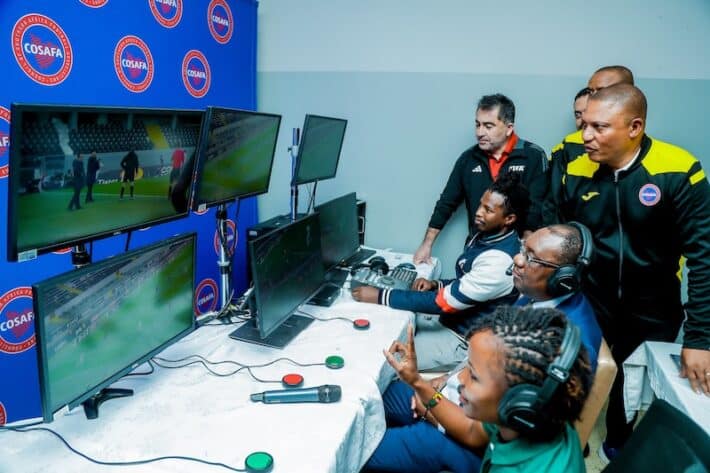Zambia hosts historic VAR training workshop for referees

A landmark video assistant referee (VAR) training programme has commenced in Zambia, marking a significant step in the country’s football development.
Organized by the Football Association of Zambia (FAZ), the five-day workshop in Lusaka aims to equip referees with the expertise required to operate VAR technology effectively.
A total of 40 referees, both male and female, are participating in the intensive training, which is being led by internationally recognized experts in the field.
The initiative underscores Zambia’s commitment to integrating modern officiating technology into its domestic leagues and competitions.
Expert-led training programme
The workshop is being conducted by prominent specialists, including FIFA IT Support and COSAFA VAR expert Ramy Gamal, FIFA VAR instructor Carlos Astroza, and COSAFA Referee Manager Felix Tangawarima, who also serves as the VAR Project Manager.
Their presence brings a wealth of knowledge and experience, ensuring that Zambian referees receive top-tier instruction on VAR protocols and operations.
With VAR technology becoming increasingly important in global football, FAZ sees this initiative as a crucial step toward improving officiating standards in the country and the broader region.
A first for the region
This training programme is the first of its kind in East, Central, and Southern Africa, representing a major milestone in the region’s adoption of VAR technology.
As leagues across Africa strive to enhance officiating accuracy and minimize controversial decisions, Zambia is positioning itself as a leader in this technological advancement.
Speaking at the opening ceremony, FAZ President Andrew Kamanga expressed gratitude to COSAFA for supporting the initiative and highlighted its significance in Zambian football’s long-term development.
Please convey this message to the COSAFA management to say that we are very grateful for the assistance you have given us in this initiative.
The implementation of VAR cannot be successful without trained personnel. This exercise is essential to ensure that we are ready to undertake the commitment we have made, Kamanga said.
He also emphasized Zambia’s broader efforts to modernize its football infrastructure, citing the recent introduction of Global Tracking System (GTS) equipment for all Super League teams, both men’s and women’s.
We are already working hard to integrate technology into our game, as demonstrated by the recent delivery of Global Tracking System equipment to all our Super League teams, both men’s and women’s.
All of these developments are embedded in our 10-year strategic plan, which we have named Vision 2030, he added.
As Zambia takes this significant step forward, the successful implementation of VAR could pave the way for its adoption in domestic leagues, ensuring greater accuracy in decision-making and enhancing the overall quality of football in the region.







